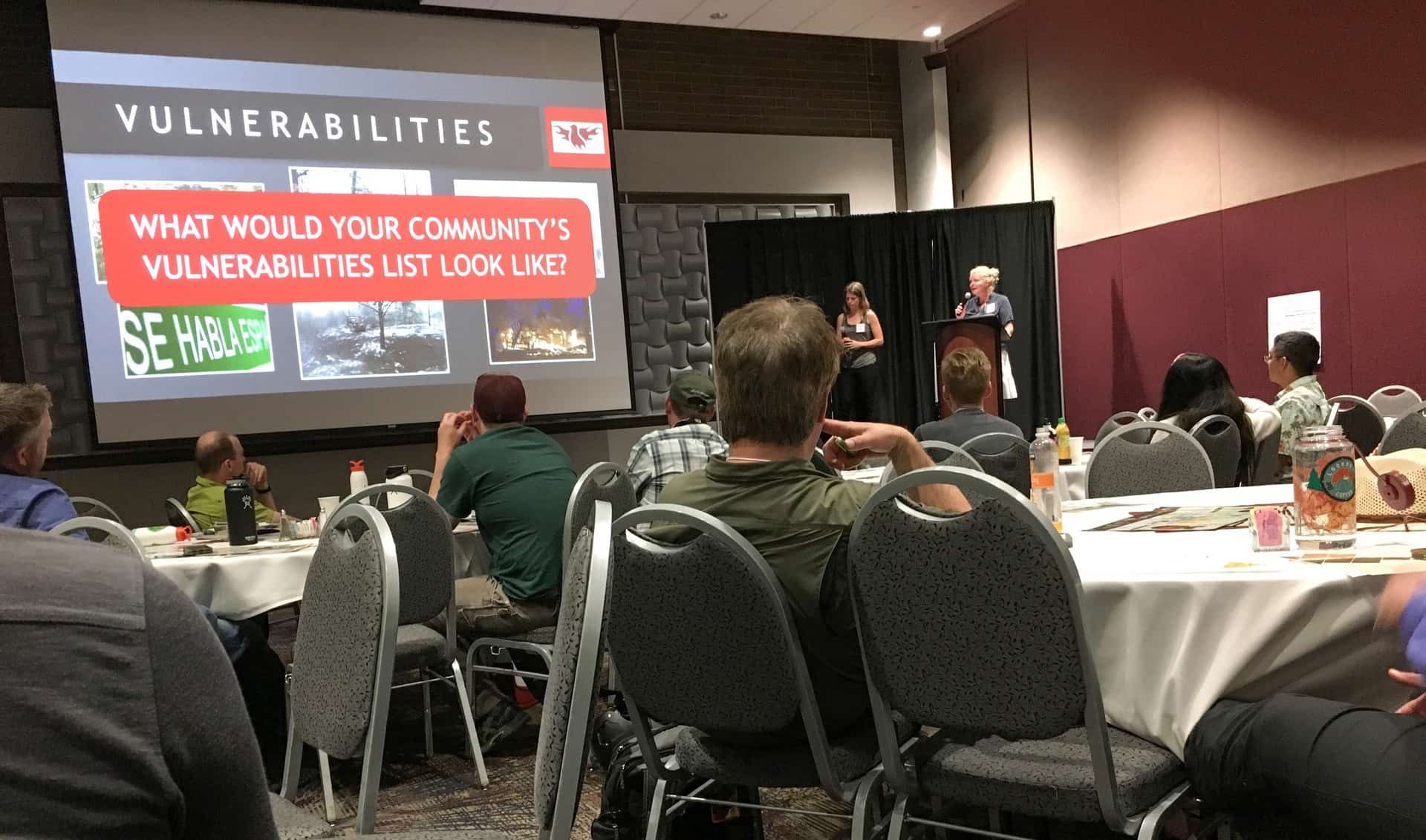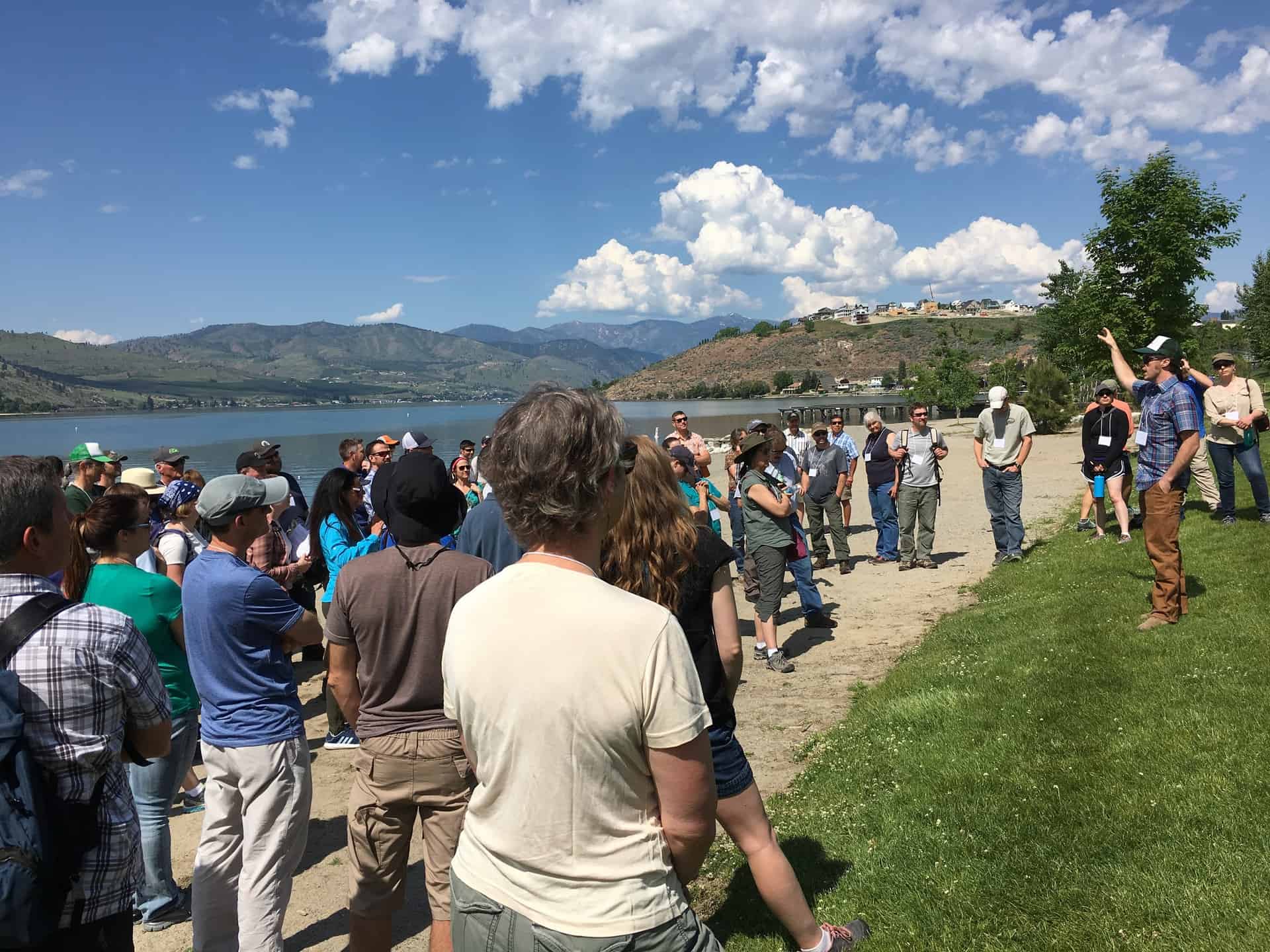Photo Credit: 2018 Fire Networks Workshop attendees learning about local fire adaptation efforts from our field day hosts. Photo by Fire Adapted Communities Learning Network
It surprises no one reading this that relationships matter. But a recent workshop in Wenatchee, Washington, provided excellent examples of how investments in intangible assets — like well-tended relationships and strong network ties — can have concrete outcomes. And these weren’t just the success stories people shared. It happened in real time.
Repurposing Resiliency
Our learning networks were created to tackle “wicked problems.” To address what sometimes look like almost impossible challenges. Turns out, that means our networks can make the “extremely difficult” look simple. Like hosting 130 people for a workshop in a town without a hotel that big, 50+ miles away from the sites you really need them to see. And then the buses don’t show up.

This workshop was the first gathering of members from all four national fire networks — Fire Adapted Communities Learning Network (FAC Net), Fire Learning Network (FLN), Prescribed Fire Training Exchanges (TREX) Coaches Network and Indigenous Peoples Burning Network (IPBN) — plus the Washington State Fire Adapted Communities Learning Network (WAFAC). Credit: Fire Adapted Communities Learning Network
If you’ve ever hosted a field tour, think about that for a moment: the buses weren’t there at our 8:00 am departure time. (And, as it turned out, weren’t planning to arrive for another month, despite several calls confirming the arrangements.) But the field day hosts from the Washington Fire Adapted Communities Learning Network (WAFAC) have spent a lot of time over the last months and years, planning and working together about how they can help communities respond before, during and after wildfire. Which in some cases includes evacuation planning. Which includes transportation. So, a room full of people making urgent phone calls … and we were climbing onto three shiny tour buses by 9:30 am. In the greater scheme of things, this is a small thing — but an excellent reminder that investments in working together pay off, sometimes in unexpected ways .

Sweet success! Credit: Fire Adapted Communities Learning Network
Unfortunately, the late start did mean that we couldn’t make it all the way up to Pateros for the centerpiece of the field day, seeing a landscape hit hard by wildfires in 2014 and 2015, and hearing from the people who have been working there ever since to help people recover. But these folks had a story to share — and a generous network spirit. So about a dozen people from the Okanogan County Long Term Recovery Group (OCLTRG) — director, disaster case managers, volunteer coordinator and volunteers — packed up artifacts and videos, piled into vans, and headed south to meet us in Wenatchee.
And it’s a good thing they did. At the end of the week, we were asked to reflect on how our perception of wildfire issues had changed over the course of the workshop. The most common response — about half of those who shared their answers — was a better awareness of the importance of the “recovery” part of the wildfire cycle (including the need to plan for it, and the power of networks to be in service to it).

It’s no surprise that the Washington State Fire Adapted Communities Learning Network designed a fire adaptation infographic that highlights the before-during-after nature of this work. A logo-free version is available for re-use, click on the image above to request it through their member profile. Credit: Washington State Fire Adapted Communities Learning Network
Do check out the OCLTRG website to learn about their work — essentially connecting one-on-one with wildfire survivors to help each household figure out its recovery plan, and then helping them navigate the complex maze of resources they may need.

“My biggest aha moment was finally recognizing/understanding why Annie and Hilary were always pushing the need to do more planning for post-fire recovery.” – 2018 Fire Networks Workshop participant. Credit: Liz Rank, The Nature Conservancy
Making It Happen
This workshop also had an important outcome that wasn’t on the agenda. WAFAC had been communicating with their elected officials — including the governor and his staff — quite regularly since the 2014 fire season. In fact, a spring roundtable planned by the governor’s staff was to have included discussion of fire adapted communities issues, but had to be postponed. The governor would be available May 23, at 5:00 pm. WAFAC took a collective deep breath, and figured out how to work that in, between the workshop field day and an evening reception. Having network members coming in from all over the country helped galvanize WAFAC’s efforts to make the postponed roundtable session come to fruition.
And so, promptly at 5:00 pm, Governor Jay Inslee — along with Regional Forester Jim Peña, Senator Brad Hawkins, Representative Mike Steele, and representatives from the office of U.S. Senator Patty Murray, the Bureau of Land Management and Washington State Department of Natural Resources — sat down with a couple dozen members of WAFAC and FAC Net. Network members focused brief remarks on a few themes related to their local work, how being in the network affects that, and how we can best move forward.

Governor Jay Inslee, Nick Goulette (Watershed Research and Training Center/ FAC Net), Senator Brad Hawkins and Regional Forester Jim Pena were among the participants in “Connections and Capacity: Stories of Resilience,” a roundtable hosted by Washington State Fire Adapted Communities Learning Network on May 23. Credit: Fire Adapted Communities Learning Network
Participants left the roundtable visibly thrilled by the opportunities they saw. Clips from the governor and others who spoke briefly at the reception immediately afterwards give a good sense of the value that they see in learning from the networks (check out this coverage by KOHO). A summary of lessons learned is being prepared, which will talk about this roundtable in more depth, and how it helped link work on the ground — locally, and from across the country — to the policy level.
Taking a Chance
On another scale entirely, the relationships within the networks made another, unexpectedly rich, session possible — one that was valuable to those who were there, and worth adding to the toolbox of ways to learn from each other.

Nicole Reese (with Fire Adapted Colorado) painted in watercolor — fireweed, of course — and channeled the spirit of Bob Ross, a good clue that this wasn’t going to be an ordinary open mic night. Credit: Fire Adapted Communities Learning Network
Open mic night invited people to share their talents. And people did, with great generosity of spirit. The call for participants was open-ended, not necessarily directed to our work: it was an invitation to share more of ourselves. The result was the entertaining evening we’d looked forward to, but so much more: it demonstrated “thinking outside the box” — watercolor painting was unexpected, to say the least. And among the many offerings from the poets, spoken-word artists, storytellers and singer-songwriters who stepped up were subtle, powerful, gentle, painful and profound messages and metaphors that spoke to our own lives, and our work together.
In short, this experiment provided much more than an evening’s diversion. Its success both relied on the trust among people there, and strengthened it. Many thanks to Forest Schafer for skillfully guiding us through the evening as emcee.
So, How’d It Go?
The objectives, as well as logistics, of the workshop were complex.
We wanted to strengthen the ties among the various networks, since this was the first workshop where members of all four national networks took part, along with WAFAC. And each network needed time together to work on their own strategies. And we needed to be able to learn all we could about the amazing progress in Washington, especially since their catastrophic fire experiences of 2014 and 2015.
Further complicating this, the 130 participants probably had at least 120 different job titles. Some people were brand new members of their network. Others had years of experience as members of a network … or two or three networks.
And we had three days.
I suspect there are 130 different answers to how well the objectives on the agenda were met. That feedback is still being collected, and will undoubtedly spark numerous conversations and inform the details of future workshops. But in the meantime, I like a set of personal objectives someone shared with me:
- Reconnect with someone you met at a previous gathering;
- Make one new connection;
- Take one new piece of information you learned back to your workplace.
I like that this list highlights the value of each of us going into a workshop with our own set of objectives (or goals or wishes, or whatever plain English word you’d rather use). And, even though she used the word “connection”… it’s relationships again, isn’t it?
Please note that comments are manually approved by a website administrator and may take some time to appear.


What a great recap of a well spent week with friends. Thanks Liz!
Nice recap, Liz, of another very powerful workshop event! FAC Net workshops are like no other. The relationships forged, the exchange of ideas, stories, experiences, the passion, the amazing work being done across the country never ceases to amaze me. I always leave exhausted, but, rejuvenated as well. Thank you all for another magnificent experience.
As an attendee of the workshop who is not a member of a network, I still felt included and uplifted by the strong relationships evident during the event. Everywhere I turned there was something interesting being talked about, things to learn, perspectives on complex situations being compared. And jokes! Then to have the field day blow up and get pieced back together so effectively? Another testament to the investments that have been made in relationships built locally as well as within the fire networks.
Excellent workshop!
I love the premise of this blog Liz. It is also beautifully written. Thanks for capturing those rich and productive days so we can revisit all that was shared.